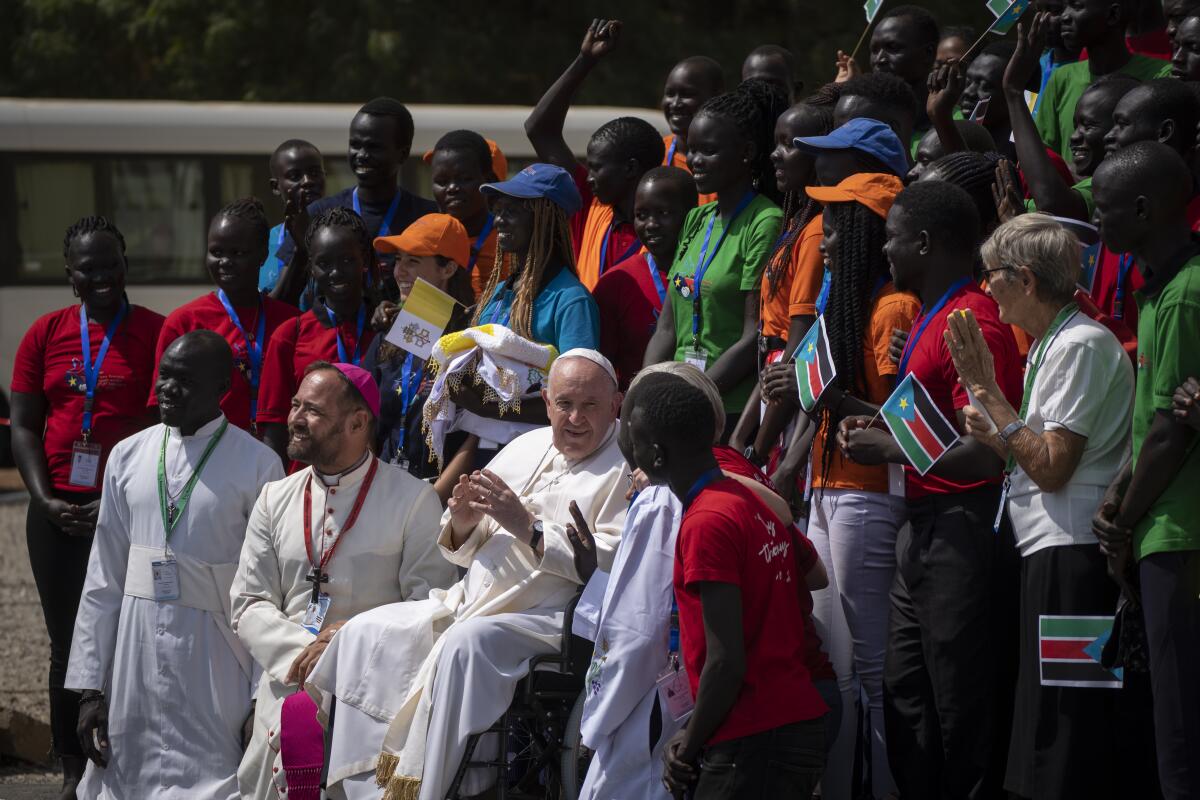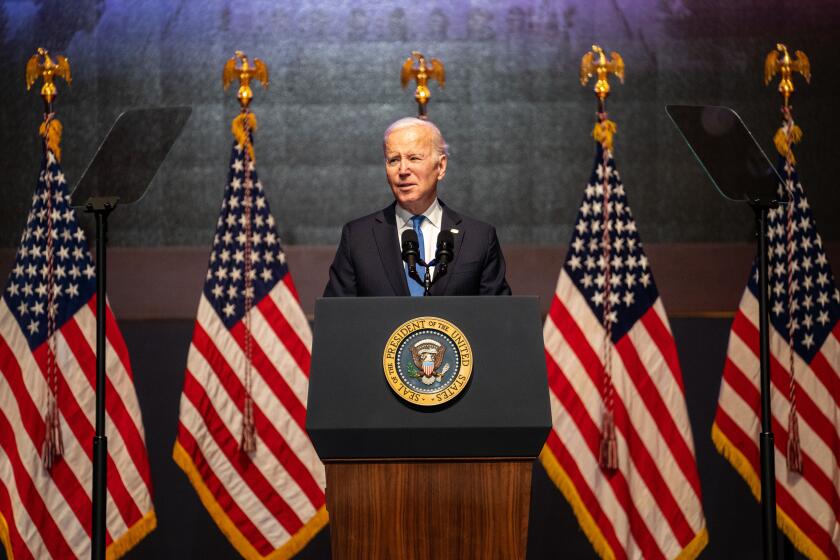Pope says South Sudan’s future depends on its treatment of women

JUBA, South Sudan — Pope Francis warned Saturday that South Sudan’s future depends on how it treats its women, as he highlighted their horrific plight in a country where sexual violence is rampant, child brides are common and the maternal mortality rate is the highest in the world.
On his second and penultimate day in Africa, Francis called for women and girls to be respected, protected and honored during a meeting in the South Sudanese capital of Juba with some of the
2 million people who have been forced by fighting and flooding to flee their homes. Women, girls and children make up the majority of those displaced.
The encounter was one of the highlights of Francis’ three-day visit to the world’s youngest country and one of its poorest. Joined by Archbishop of Canterbury Justin Welby and the Presbyterian head of the Church of Scotland, Francis is on a historic ecumenical pilgrimage to draw global attention to the country’s plight and encourage its stalled peace process.
As Biden prepares for his State of the Union speech, polls show Americans in a negative mood. But how much does that truly measure sentiment, rather than partisanship?
The aim of the three-way visit is to encourage South Sudan’s political leaders to implement a 2018 peace accord ending a civil war that erupted after the overwhelmingly Christian country gained independence from mostly Muslim Sudan in 2011.
Greeted by song and high-pitched ululation, Francis urged the hundreds of people gathered at Freedom Hall to be “seeds of hope” that will soon bear fruit for the country of 12 million.
“You will be the trees that absorb the pollution of years of violence and restore the oxygen of fraternity,” he said.
The head of the United Nations mission in South Sudan, Sara Beysolow Nyanti, told Francis that women and girls were “extremely vulnerable” to sexual and gender-based violence, with U.N. statistics estimating some 4 out of 10 have been victim to one or more forms of assault.
“If the women of South Sudan are given an opportunity to develop, to have space to be productive, South Sudan will be transformed,” she told Francis.
The pope picked up her theme in his remarks, saying women were the key to South Sudan’s peaceful development.
“Please, protect, respect, appreciate and honor every woman, every girl, young woman, mother and grandmother,” he said. “Otherwise, there will be no future.”
According to UNICEF, roughly 75% of girls in South Sudan don’t go to school because their parents prefer to keep them at home and set them up for a marriage that will bring a dowry for the family.
Half of South Sudan’s women are married before age 18, and they face the world’s highest maternal mortality rate. The U.N. Commission on Human Rights in South Sudan said in a report last year that, overall, women and girls here live a “hellish existence.”
“South Sudanese women are physically assaulted while being raped at gunpoint, typically held down by men while being abused by others. They are told not to resist in the slightest way, and not to report what happened, or they will be killed,” the report said.
Maria Nyataba Wur, a displaced woman now living in Juba who attended Francis’ event, told the Associated Press that one of her neighbors was raped in front of her children, so violently that she limped for days afterward.
“According to what she told us as a survivor was that they tied her legs apart and then three people entered her, raped her,” Wur said, adding that she lost track of the neighbor during her own efforts to flee to safety in the capital.
Mariam Nyantabo, another 36-year-old resident of a Juba protection camp, said women were grateful for Francis’ visit.
“The plight against women is shocking,” she said, noting the risk of rape comes from everyday chores like collecting firewood. “His visit is blessed to women of South Sudan, and I believe there will be a great change; the suffering of the women will be reduced.”
Welby too addressed the plight of women during his remarks at an ecumenical prayer service later Saturday. He praised their “incredible” strength when “on top of the grief of conflict and the responsibility to provide for your families, many of you live with the trauma of sexual violence and the daily fear of mistreatment in your own homes.”
To the men in the audience, Welby was more blunt: “You will value and honor women, never raping, never violent, never cruel, never using them as if they were there to satisfy desire,” he said to applause from the crowd.
Francis began his day meeting with the priests and nuns who minister to South Sudan’s people, urging them to accompany their flocks by joining in their suffering.
At the St. Theresa Cathedral, he heard of the sacrifice nuns have made over the years, including the 2021 ambush killings of Sisters Mary Daniel Abut and Regina Roba Luate of the Congregation of Sisters of the Sacred Heart.
Sister Regina Achan, from the same congregation, said Francis’ visit would encourage other sisters to keep serving the people of South Sudan. “We stand with them because we are their voices; we don’t run away at difficult times,” Achan said.
Sister Orla Treacy, an Irish Loreto nun who runs a secondary school for girls in the central town of Rumbek, walked for more than a week with her students to see the pope in Juba. The school makes contracts with the girls’ extended families, with relatives committing to not remove the girls from school to get married.
“It is still a challenge for young women, but it is changing and the young women are now coming with a vision for what they also want for their country as well,” Treacy said at the cathedral event.
Upon arrival Friday, Francis issued a blunt warning to President Salva Kiir and his onetime rival and now deputy Riek Machar that history will judge them harshly if they continue to drag their feet on implementing their peace accord.
Kiir, a Catholic, committed the government to return to peace talks — suspended last year — with groups that didn’t sign onto the 2018 accord.
And late Friday, Kiir granted presidential pardons to 71 inmates at Juba’s central prison in honor of the ecumenical pilgrimage, including 36 on death row.
More to Read
Sign up for Essential California
The most important California stories and recommendations in your inbox every morning.
You may occasionally receive promotional content from the Los Angeles Times.











